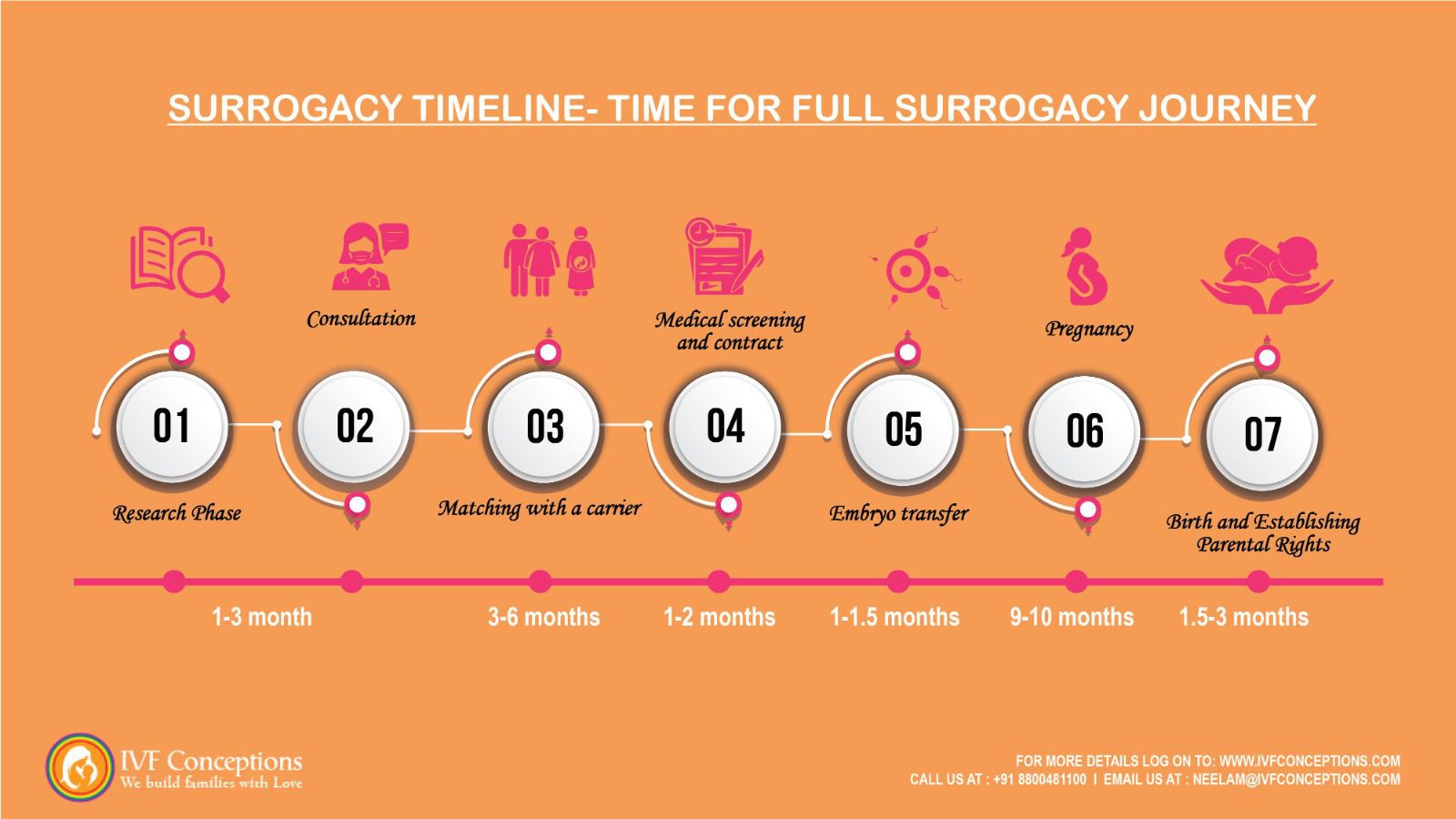How Intended Parents Prepare Themselves for Surrogacy: A Comprehensive Guide

Surrogacy is a life-changing journey, offering intended parents the opportunity to fulfill their dream of having a child. However, it is also a process that requires significant preparation, both emotionally and practically.
Whether you’re opting for traditional or gestational surrogacy, this guide will help you understand how intended parents can best prepare for surrogacy, ensuring a smoother and more successful journey.
Get in touch for a Free Surrogacy Consultancy:
📲 +91-8800481100 ( WhatsApp, Line, Viber)
More resources on surrogacy topic:
How long does the surrogacy process take?
How much does gestational surrogacy cost?
Top 4 cheapest countries for surrogacy

What Is Surrogacy?
Surrogacy is an arrangement where a woman (the surrogate) carries a child for another individual or couple (the intended parents). There are two primary types of surrogacy:
- Traditional Surrogacy: In traditional surrogacy, the surrogate’s eggs are used, making her the biological mother. The intended father’s sperm or donor sperm is used to fertilize the egg through intrauterine insemination (IUI).
- Gestational Surrogacy: This more common form of surrogacy involves the use of the intended mother’s eggs or donor eggs and the intended father’s sperm or donor sperm. The embryo is created via in vitro fertilization (IVF) and implanted into the surrogate, who has no genetic relationship with the child.
How Intended Parents Can Prepare for Surrogacy
Surrogacy requires extensive planning, from emotional readiness to legal and financial considerations. Here’s a comprehensive breakdown of how intended parents can prepare themselves for surrogacy:
- Emotional Preparation
Surrogacy is an emotional journey, filled with highs and lows. Intended parents must be emotionally prepared to handle the various aspects of the process, including potential setbacks.
- Acknowledge Emotional Challenges: The surrogacy process can be long and emotionally taxing. It’s essential to recognize that there may be emotional challenges, including feelings of loss of control or jealousy if you’re not the one carrying the child.
- Seek Counseling: Many surrogacy agencies recommend counseling for intended parents to help them process their feelings and prepare for the journey. Counseling can also assist with managing expectations and building a positive relationship with the surrogate.
- Prepare for Relationship Dynamics: The relationship with your surrogate is a unique one. Intended parents need to establish open communication, respect, and trust with the surrogate. Consider discussing the level of involvement you’d like to have throughout the pregnancy, such as attending medical appointments or being present at the birth.
-
Legal Preparation
Surrogacy laws vary widely depending on your location, and it’s crucial for intended parents to be fully aware of the legal complexities involved.
- Hire an Experienced Attorney: A surrogacy lawyer is essential for navigating the legal aspects of surrogacy. The attorney will draft legal contracts, outline parental rights, and ensure that all parties are protected throughout the process.
- Understand State and International Laws: If you are pursuing surrogacy in another state or country, research the legal framework surrounding surrogacy. Some places may have strict regulations or may not permit surrogacy for single parents or same-sex couples.
- Parental Rights: Legal documentation should clarify the intended parents’ parental rights and outline the surrogate’s relinquishment of parental rights after birth. Ensure that your name will be on the birth certificate, which is a legal requirement in most surrogacy agreements.
-
Financial Preparation
Surrogacy is a significant financial investment, with costs ranging from $100,000 to $200,000 or more. It’s important to be financially prepared before embarking on the journey.
- Understand Surrogacy Costs: The total cost of surrogacy includes agency fees, surrogate compensation, legal fees, medical expenses (including IVF and prenatal care), and additional expenses such as insurance and travel.
- Create a Financial Plan: Ensure that you have a detailed budget that includes all surrogacy-related costs, plus a contingency fund for unexpected expenses. Research whether any of your medical insurance policies will cover parts of the process, such as IVF or pregnancy-related costs.
- Explore Financing Options: Some intended parents may need financial assistance to cover the high costs of surrogacy. You can explore options such as surrogacy loans, fundraising, or dipping into savings. Some employers also offer fertility benefits that may help reduce costs.
- Medical Preparation
Medical readiness is a crucial part of the surrogacy process, particularly if you are using your own genetic material to create the embryo.
- Fertility Assessments: If you are providing the sperm or egg for the surrogacy process, undergo fertility assessments to ensure that your reproductive health is optimal for the IVF process. You may need to consult with a fertility specialist.
- Egg Retrieval and IVF: Intended mothers (or egg donors) will go through the egg retrieval process, which includes hormone treatments and a minor surgical procedure to extract the eggs. The IVF process involves fertilizing the eggs with sperm in a laboratory to create embryos.
- Genetic Testing: Many intended parents choose to have preimplantation genetic testing (PGT) performed on the embryos to screen for genetic disorders before implantation. This step can increase the chances of a successful pregnancy.

Choosing the Right Surrogacy Agency
Partnering with the right surrogacy agency is crucial to the success of your surrogacy journey.
- Research Agency Reputation: Look for an agency with a solid reputation for supporting both surrogates and intended parents. The agency should provide services such as surrogate matching, legal coordination, and emotional support.
- Ask About Services: Ensure the agency offers a comprehensive range of services, including surrogate screening, matching, legal guidance, and medical coordination. Some agencies may also provide psychological counseling for intended parents.
- Surrogate Matching: The agency will help match you with a surrogate whose values, preferences, and expectations align with yours. This is a critical step, as the surrogate will play a significant role in your life for at least nine months.
Build a Support System
Surrogacy can be emotionally overwhelming, so it’s essential to have a strong support network in place.
- Family and Friends: Share your surrogacy journey with trusted family members and friends who can offer emotional support throughout the process.
- Join Surrogacy Support Groups: Many intended parents find comfort and guidance by connecting with others who have gone through or are currently going through surrogacy. Online forums and local support groups can provide valuable advice and reassurance.
Prepare for Parenthood
The surrogacy process is only the beginning of your parenting journey. Prepare yourself for the responsibilities and joys of parenthood.
- Prepare Your Home: As the baby’s arrival approaches, ensure that your home is ready. Create a nursery, purchase baby essentials, and baby-proof your living space if necessary.
- Attend Parenting Classes: Many intended parents choose to take parenting classes to help them feel more confident in caring for a newborn. These classes can cover everything from feeding and diapering to infant CPR.
- Create a Birth Plan: Work with your surrogate to develop a birth plan that outlines everyone’s expectations for the delivery. Discuss whether you’d like to be present in the delivery room and what role the surrogate will play after the birth.

Surrogacy Process steps to follow:
#1. First of all, consult a doctor
The very first thing, after you have decided to go for gestational surrogacy, is to consult a physician or more precisely a fertility specialist.
This is an essential process to review what you want from a gestational surrogate, the surrogacy cost, the insurance cost, legal implications, and other medical information.
Make sure every decision you make is based on the consultation of the doctor. Tell about any illness that you have been suffering from, and the medicines you are allergic to. All these little things will help your doctor know you better and prescribe a safe and effective procedure for you. Make sure you have done all the necessary check-ups before starting your surrogacy journey.
#2. Matching with surrogate
Having a perfect match for the intended parents is one of the most important steps in the surrogacy cycle. There are some desires and expectations to be met by the planned parents from the surrogate. So, here’s the process of how the match works-
- Once the surrogacy agency selects a surrogate mother and expected parents who have similar surrogacy plans, their profiles will be given to each other to see if there is interest in a profile. In the case of independent surrogacy or private surrogacy, parents reach out to potential surrogate mothers themselves. They can also look out for options like- surrogate mothers as a friend or relative.
- If both parties are interested in moving forward, by phone calls, emails, or in-person meetings they can better understand each other and then formalize the process by drafting the first legal contract. Prepare legally
Once the intended parents and the surrogate have decided to move together, they will both have to sign the surrogacy legal agreement. Both the planned parents and the surrogate will each have a different solicitor to ensure their interests are protected. Each party is required to meet separately with the attorney. Once everyone has met the contract’s common terms, the contract will be signed.
- For prospective surrogates: your attorney will consult with you to explore all surrogacy legal aspects, ranging from insurance to potential hazards. Your lawyer will review the agreement drafted by the parents ‘ attorney to ensure that it meets your requirements.
- For prospective intended parents: your attorney will consult with you personally to discuss your legal rights, potential hazards, and the agreement you and your partner agreed to.
#3. Prepare physically
Once the agreements have been signed, the medical procedures are now turned on. Medication will be given to the planned mother or egg donor to help her produce the eggs and go for an egg recovery surgery. In the process, the eggs are then fertilized to create an embryo. Then this embryo is passed to the surrogate’s uterus.
Once the surrogate is pregnant and the child’s heartbeat is heard, the surrogate will receive compensation and regular payments.
#4. Prepare yourself emotionally
With the fact that another woman or surrogate mother will carry and deliver their baby, intended parents have to prepare themselves emotionally. They must build a healthy relationship with the surrogate and all the amenities will have to be provided to her.
Make sure she qualifies in all aspects of the screening and is healthy for the nine months to carry your baby. For example, there will also be legal contracts involved. The surrogates need assessment and therapy because there are possible mental and emotional problems dependent on a surrogate mother’s connection to a baby.
#5. Stay connected
While undergoing the process of surrogacy you should stay connected to the surrogate as well as to your relatives. With the surrogate, you can possibly go for the ultrasound appointments, accompany her for the shopping, and many more. While it is important to stay connected with the surrogate, it is equally important to stay connected with your friends and family. Surrogacy is a new concept and it does not require that everyone understands it. It is okay to have mixed reactions from your family and friends on surrogacy. So, stay connected and stay strong.
#6. Prepare yourself financially
Commercial surrogacy is an expensive procedure and surrogacy costs in the USA can be ridiculously high.
The moment you plan for a new baby may be emotionally overwhelming in the anticipation and excitement of meeting your baby. Because you only have to prepare for nine months, it may feel like you don’t have enough time to prepare financially.
As surrogacy cost is much higher and can be out of reach of many would-be parents, they should take the time to understand the average surrogacy cost breakdown along with surrogate compensation.
The financial expenses in surrogacy include legal expenses, medical expenses, and agency expenses, surrogacy compensation, egg donor fee ( if needed).
Read more about it.
#7. Stress management in surrogacy
Everybody understands that it can be difficult to be pregnant. There is an extra level of intensity during pregnancy for surrogate mothers.
Because the surrogate’s health has a strong impact on the unborn baby’s health, Nowadays, surrogates have a wealth of information available for tips on how to maintain optimal physical and mental health, including low-stress levels.
However, two parties are deeply invested in pregnancy in surrogacy. By trusting someone else to carry their baby, intended parents experience just as much stress while waiting for their child, coupled with the lack of control that they commit to. Here are some ways in which you can reduce stress –
- Develop the habits which make you feel good about yourself
- Talk to one another
- Make time for self-care
- Take help from outside
- Keep yourself informed about the obstacles
- Talking to your friends and building your surrogacy network
- Have fresh air etc.
 Conclusion
Conclusion
Preparing for surrogacy as intended parents is a multifaceted process that involves emotional, financial, legal, and medical preparation.
By carefully planning and seeking the support of experienced professionals, intended parents can navigate the complexities of surrogacy with greater ease. Every surrogacy journey is unique, but with the right preparation, intended parents can look forward to the moment they finally welcome their child into the world.
If you’d like to learn more about IVF, Egg Donation, or international surrogacy services, check out the rest of our website at IVF Conceptions. We offer legally secure and affordable surrogacy consulting services for FREE.
 FAQs: Preparing for Surrogacy
FAQs: Preparing for Surrogacy
- What emotional preparation is needed for surrogacy?
- Intended parents should acknowledge the emotional challenges, seek counseling if needed, and prepare for the unique relationship dynamics with the surrogate.
- How do intended parents manage surrogacy costs?
- Intended parents should understand the total costs, create a detailed financial plan, and explore financing options like surrogacy loans or employer benefits.
- What are the legal requirements for surrogacy?
- Hiring a surrogacy attorney is crucial to navigate contracts, and parental rights, and ensure all parties are legally protected throughout the surrogacy process.
- What medical steps are involved in surrogacy preparation?
- Intended parents should undergo fertility assessments, consider genetic testing for embryos, and prepare for the IVF process if using their own genetic material.
- How do you choose the right surrogacy agency?
- Look for an agency with a good reputation that offers comprehensive services such as surrogate screening, matching, legal guidance, and emotional support.
- How do intended parents prepare for parenthood during surrogacy?
- Prepare your home for the baby, attend parenting classes, and work with the surrogate to create a birth plan that outlines everyone’s expectations for delivery.


 Conclusion
Conclusion FAQs: Preparing for Surrogacy
FAQs: Preparing for Surrogacy